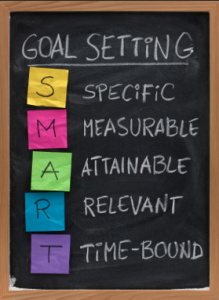It’s important to establish goals and goal-setting in your private practice to maintain a marketing and competency plan in order to grow or maintain your practice. Without goals, it’s easy to fall within a rut or status quo and this lack of growth will affect your practice in minor or major ways. Goals allow you to achieve certain objectives to fulfil your practice vision or dreams. These visions or dreams can include building your clientele or advancing yourself through specialization or expertise in the psychotherapy field. Sit back and ask yourself – What do I see when I envision my dream practice? Then ask yourself – How can I get there? What goals do I need to make?
Examples of some goals related to competencies may include ones that centre on delivering effective client care and establishing trust in the therapeutic relationship (which may be examined in client feedback and supervision etc.,), developing more sound knowledge of medical and psychiatric illnesses (through courses and reading), developing a learning plan that includes specialization or furthering your competency level based on the client population you counsel, developing your communication skills through learning basic counselling skills (if you are a new psychotherapist), or goals centred on professionalism or referral networking. Each of these goals listed above can be broken down into specifics and tailored to meet your preferences and desired outcomes. It’s important to list your goals as either short term or long term goals and to be easy on yourself if you do not meet a deadline in time. Goals can always be altered.
Setting business and marketing goals will also help you to expand your clientele. These goals can include networking, revenue expenses and advertising. It’s important to continue to revise and revisit goals to determine if they are helping you succeed in building your practice. If you find you are not meeting these goals on time or at all, maybe it’s time to revise.
Using the SMART technique to goal-setting will be useful to help you get started. Goals should be:
1. Specific – setting clear, concrete goals. E.g. I will take four courses a year to expand my expertise for my specific clientele.
2. Measurable – a way to indicate a marker of when you’ve reached your goal. This could include a frequency to accomplish that goal. E.g. I will read these two therapy books by the end of the month.
3. Achievable – a way to ensure your goals are realistic. E.g. Contacting two other psychotherapists to network this week vs. Contacting 25.
4. Relevant – A goal that is applicable to your private practice and professional development. E.g. Is it wiser to choose courses that suit your current client population than to take courses related to a client population that you plan not to see or don’t see at the present moment.
5. Time Related – Setting a timeline to guide your progress. It is more motivating to set a tighter deadline than one that is long-term.
Whether you are new to private practice or are more experienced, goal-setting is helpful to continue to expand on your practice while reflecting on where you are and where you would like to be. Do you have any tips on goal-setting for private practice psychotherapists? I’d love to hear them.
Andrea Cashman is a registered psychotherapist in private practice who has founded Holistic Counselling Services for individual clients seeking therapy in Ottawa, Ontario. She also practices at The Ottawa Hospital as a registered nurse. Feel free to comment below or contact her at [email protected] or visit her website at www.holisticcounsellingservices.ca
References:
http://www.drtanja.com/articles/setting_smart_goals.shtml
*The views expressed by our authors are personal opinions and do not necessarily reflect the views of the CCPA
